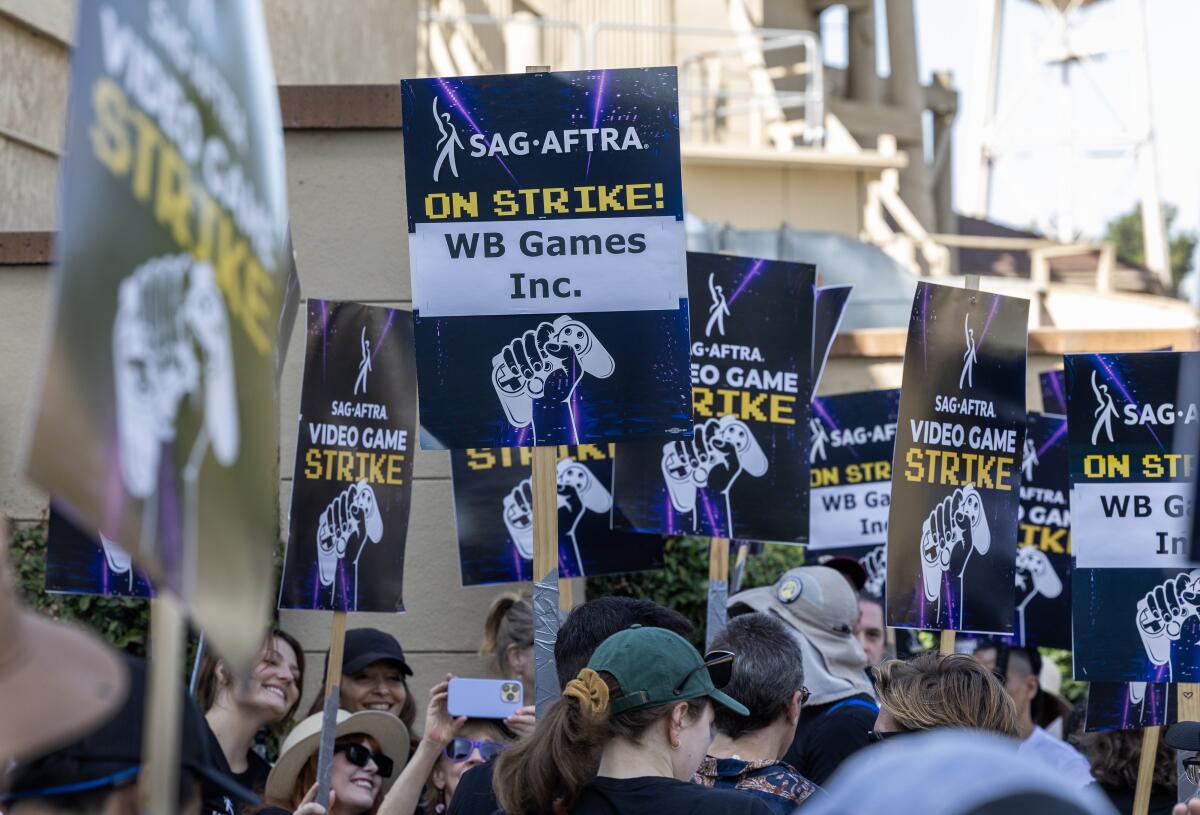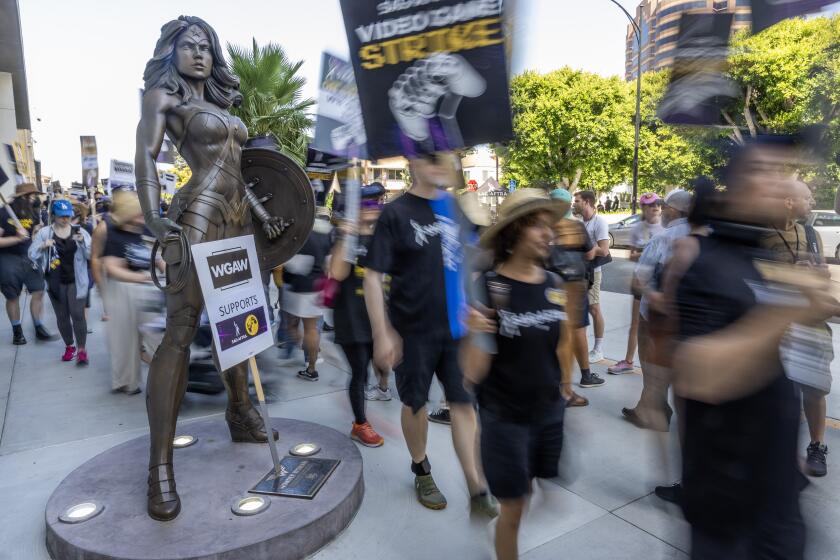SAG-AFTRA, video game companies reach tentative deal that would end strike

- Share via
Video game performers and producers have hammered out a tentative contract agreement, reaching terms that could end a nearly yearlong strike over artificial intelligence.
The Screen Actors Guild-American Federation of Television and Radio Artists and the game companies came to a resolution on Monday, more than two years after their previous agreement covering interactive media expired. The walkout began last July.
The deal is subject to review and approval by the SAG-AFTRA National Board and ratification by the membership in the coming weeks, the union said. Specific terms of the deal were not immediately available.
Terms of a strike suspension agreement are expected to be finalized with employers soon, the union said. Until then, though, SAG-AFTRA members will remain on strike.
SAG-AFTRA members also must vote to ratify the new contract, which covers roughly 2,600 performers doing voice-acting, performance- and motion-capture work in the video game industry.
SAG-AFTRA and the video game companies are resuming contract negotiations for the first time since video game actors went on strike.
The proposed agreement would cover guild work for major industry players, including Activision Productions Inc., Disney Character Voices Inc., Electronic Arts Productions Inc., Epic Games Inc. and Take 2 Productions Inc.
Since the fall of 2022, video game performers have been fighting for a new contract containing AI protections, wage increases to keep up with inflation, more rest periods and medical attention for hazardous jobs.
Game actors went on strike in late July after contract talks broke down over AI. Throughout the walkout, performers demanded a deal that would require video game producers to obtain informed consent before replicating their voices, likenesses or movements with AI.
Video game actors are on strike after performers union SAG-AFTRA and the video game companies couldn’t agree on AI terms.
During the first few months of the strike, SAG-AFTRA reached numerous side deals with individual game companies that agreed to follow the union’s AI rules in exchange for a strike pardon. By Nov. 18, the labor organization announced that it had made AI pacts with the developers of 130 different video games.
“The sheer volume of companies that have signed SAG-AFTRA agreements demonstrates how reasonable those protections are,” Sarah Elmaleh, chair of the union’s video game negotiating committee, said in a statement in September.
While some companies earned the union’s approval, others felt its wrath.
Halfway through October, SAG-AFTRA added the popular computer game “League of Legends” to its list of struck titles in an effort to punish audio company Formosa Interactive for allegedly violating terms of the walkout. SAG-AFTRA also filed an unfair labor practice charge against Formosa, which provides voice-over services to “League of Legends,” according to the union.
Formosa denied SAG-AFTRA’s allegations.
SAG-AFTRA video game actors picketed outside Warner Bros., home of a major gaming studio, in Burbank while striking over artificial intelligence.
The biggest sticking point for actors under the umbrella of AI involved on-camera performers, whose job is often to disappear into the characters they are bringing to life. They expressed concerns that the companies’ AI proposal would leave them defenseless against the technology.
The game companies argued that their AI proposal already contained robust protections that would require employers to seek prior consent and pay actors fairly when cloning their performances.
“All performers need AI protections,” said Duncan Crabtree-Ireland, national executive director and chief negotiator of SAG-AFTRA, in an interview with The Times months ago.
“Everyone’s at risk, and it’s not OK to carve out a set of performers and leave them out of AI protections.”
This work stoppage marked SAG-AFTRA’s second video game strike in less than a decade and second overall strike in roughly a year.
While the walkout persisted, video game performers weren’t allowed to provide any services — such as acting, singing, stunts, motion capture, background and stand-in work — to struck games. Union actors were also barred from promoting any struck projects via social media, interviews, conventions, festivals, award shows, podcast appearances and other platforms.
AI was also a major sticking point during the film and TV actors’ strike of 2023. That walkout culminated in a contract mandating that producers obtain consent from and compensate performers when using their digital replica.
More to Read
Inside the business of entertainment
The Wide Shot brings you news, analysis and insights on everything from streaming wars to production — and what it all means for the future.
You may occasionally receive promotional content from the Los Angeles Times.














